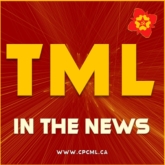Ottawa Discussion on Current Situation in Cuba with Representative of Cuban Embassy
A discussion with Dany Tur, Counselor and Deputy Head of Mission at the Embassy of Cuba in Canada, was organized by Ottawa-Cuba-Connections on November 22.
Dany opened the discussion by speaking of the urgent need to end the U.S. economic, commercial, and financial embargo against Cuba. He spoke of the October 30 UN General Assembly vote on Cuba's resolution against the blockade, which the Cuban Foreign Minister denounced as a crime of genocide. For the 32nd time, the resolution was passed, with 187 countries voting in favour, and two — the United-States and Israel — voting against.
Dany also highlighted some of the points made in Cuba's report Tumba el bloqueo (Tear Down the Blockade) which offers concrete numbers as to the damage caused by the U.S. blockade in Cuba between March 2023 and February 2024. In that period, the blockade caused material damages and losses to Cuba estimated to be more than $5 billion. Considering the value of the dollar against the value of gold in the international market, the blockade has caused quantifiable losses of about $1.5 trillion.
Dany said that the tourism industry -- an important economic sector which allows Cuba to invest in health and education -- has been specifically targeted by the U.S. The U.S. has sanctioned 231 tourism-related entities using extraterritorial measures, like the Helms-Burton Act, which are part of the blockade. The U.S. illegally and unjustly uses these to blackmail and sanction other countries and companies to keep them from doing business with Cuba. The U.S. continues using various efforts to harm the Cuban economy and the very lives of the Cuban people. This is accompanied by a media campaign to stop people from visiting Cuba with false claims that it is not a safe destination.
Dany also gave a brief historical overview to highlight both the Cuban people's struggle to attain their independence and efforts by the U.S., dating back to 1898, and even before. John Quincy Adams was instrumental in development of the Monroe Doctrine of 1823, when the U.S. declared all the Americas its domain and European colonial powers had better stay out. Cuba was a crucial part of this. Adams, as President from 1825-29 spoke of taking control of Cuba whenever the fruit would be ripe to pick. This occurred in 1898, in the war against Spain and Cuba, when the U.S. also seized and colonized the Philippines and Puerto Rico and annexed Hawaii.
During the discussion, some raised the matter of renewable energy, and Dany explained that Cuba does have renewable energy projects, and that it aims to reduce its dependency on oil. He said that given the growing intensity of natural disasters and the fact that the island is threatened with partial destruction by sea erosion, the struggle against climate change is of utmost importance for Cuba.
Some said that they appreciated that Cuban President Miguel Díaz-Canel and government representatives were on the ground following hurricane Rafael and two earthquakes, and asked how things are organized both before and after such disasters. Dany pointed out that before Rafael struck, Cuba's highly organized Civil Defense teams evacuated 200,000 people to safety and acted immediately afterwards to deal with the destruction affecting the power grid, farmland, and more. The main preoccupation is to avoid the loss of human life. "The most important factor is the people," he said.
Participants in the meeting used the occasion to make contributions to the Cuban emergency relief fund established by the Canadian Network on Cuba.
This article was published in

Tuesday,
December 17, 2024
Article Link:
https://cpcml.ca/ITN2024/Articles/TI54705.HTM
Website: www.cpcml.ca Email: editor@cpcml.ca

